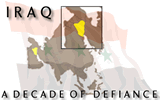
The following timeline details the Iraqi regimes repeated pattern of accepting inspections "without conditions" and then demanding conditions, often at gunpoint.
To follow the timeline, please click on each link designated by year. Example: 1991
»Select Year: 1991 | 1992 | 1993 | 1994 | 1996 | 1997 | 1998
| 1991 | Action |
| April 3, 1991 | U.N. Security Council Resolution 687 (1991), Section C, declares that Iraq shall accept unconditionally, under international supervision, the "destruction, removal or rendering harmless" of its weapons of mass destruction and ballistic missiles with a range over 150 kilometers (emphasis added). One week later, Iraq accepts Resolution 687. Its provisions were reiterated and reinforced in subsequent action by the United Nations in June and August of 1991. |
| May 1991 | Iraq accepts the privileges and immunities of the Special Commission (UNSCOM) and its personnel. These guarantees include the right of "unrestricted freedom of entry and exit without delay or hindrance of its personnel, property, supplies, equipment ... (emphasis added)." |
| June 1991 | Iraqi personnel fire warning shots to prevent the inspectors from approaching the vehicles. |
| September 1991 | Iraqi officials confiscate documents from the inspectors. The inspectors refuse to yield a second set of documents. In response, Iraq refuses to allow the team to leave the site with these documents. A four-day standoff ensues, but Iraq permits the team to leave with the documents after a statement from the Security Council threatens enforcement actions. |
| October 11, 1991 | The Security Council adopts Resolution 715, which approves joint UNSCOM and IAEA plans for ongoing monitoring and verification. UNSCOMs plan establishes that Iraq shall "accept unconditionally the inspectors and all other personnel designated by the Special Commission" (emphasis added). |
| October 1991 | Iraq states that it considers the Ongoing Monitoring and Verification Plans adopted by Resolution 715 to be unlawful and states that it is not ready to comply with Resolution 715. |